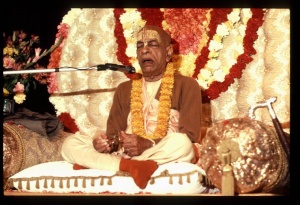CC Madhya 19.207-209 (1975): Difference between revisions
(Vanibot #0027: CCMirror - Mirror CC's 1996 edition to form a basis for 1975) |
(Vanibot #0020: VersionCompareLinker - added a link to the Version Compare feature) |
||
| Line 2: | Line 2: | ||
<div style="float:left">'''[[Sri Caitanya-caritamrta (1975)|Śrī Caitanya-caritāmṛta (1975)]] - [[CC Madhya (1975)|Madhya-līlā]] - [[CC Madhya 19 (1975)|Chapter 19: Lord Śrī Caitanya Mahāprabhu Instructs Śrīla Rūpa Gosvāmī]]'''</div> | <div style="float:left">'''[[Sri Caitanya-caritamrta (1975)|Śrī Caitanya-caritāmṛta (1975)]] - [[CC Madhya (1975)|Madhya-līlā]] - [[CC Madhya 19 (1975)|Chapter 19: Lord Śrī Caitanya Mahāprabhu Instructs Śrīla Rūpa Gosvāmī]]'''</div> | ||
<div style="float:right">[[File:Go-previous.png|link=CC Madhya 19.206 (1975)|Madhya-līlā 19.206]] '''[[CC Madhya 19.206 (1975)|Madhya-līlā 19.206]] - [[CC Madhya 19.210 (1975)|Madhya-līlā 19.210]]''' [[File:Go-next.png|link=CC Madhya 19.210 (1975)|Madhya-līlā 19.210]]</div> | <div style="float:right">[[File:Go-previous.png|link=CC Madhya 19.206 (1975)|Madhya-līlā 19.206]] '''[[CC Madhya 19.206 (1975)|Madhya-līlā 19.206]] - [[CC Madhya 19.210 (1975)|Madhya-līlā 19.210]]''' [[File:Go-next.png|link=CC Madhya 19.210 (1975)|Madhya-līlā 19.210]]</div> | ||
{{CompareVersions|CC|Madhya 19.207-209|CC 1975|CC 1996}} | |||
{{RandomImage}} | {{RandomImage}} | ||
| Line 10: | Line 11: | ||
:sā ca mene tadātmānaṁ | :sā ca mene tadātmānaṁ | ||
:variṣṭhāṁ sarva-yoṣitām | :variṣṭhāṁ sarva-yoṣitām | ||
:hitvā gopīḥ | :hitvā gopīḥ kāmayānā | ||
:mām asau bhajate priyaḥ | :mām asau bhajate priyaḥ | ||
:tato gatvā vanoddeśaṁ | :tato gatvā vanoddeśaṁ | ||
:dṛptā keśavam abravīt | :dṛptā keśavam abravīt | ||
:na pāraye | :na pāraye 'haṁ calituṁ | ||
:naya māṁ yatra te manaḥ | :naya māṁ yatra te manaḥ | ||
:evam uktaḥ priyām āha | :evam uktaḥ priyām āha | ||
:skandham āruhyatām iti | :skandham āruhyatām iti | ||
| Line 26: | Line 29: | ||
<div class="synonyms"> | <div class="synonyms"> | ||
sā—Śrīmatī Rādhārāṇī; ca—also; mene—considered; tadā—at that time; ātmānam—Herself; variṣṭhām—the most glorious; sarva-yoṣitām—among all the gopīs; hitvā—giving up; gopīḥ—all the other gopīs; | sā—Śrīmatī Rādhārāṇī; ca—also; mene—considered; tadā—at that time; ātmānam—Herself; variṣṭhām—the most glorious; sarva-yoṣitām—among all the gopīs; hitvā—giving up; gopīḥ—all the other gopīs; kāmayānāḥ—who were desiring the company of Kṛṣṇa; mām—Me; asau—that Śrī Kṛṣṇa; bhajate—worships; priyaḥ—the most dear; tataḥ—thereafter; gatvā—going; vana-uddeśam—to the deep forest; dṛptā—being very proud; keśavam—unto Kṛṣṇa; abravīt—said; na pāraye—am unable; aham—I; calitum—to walk; naya—just carry; mām—Me; yatra—wherever; te—Your; manaḥ—mind; evam uktaḥ—thus being ordered by Śrīmatī Rādhārāṇī; priyām—to this most dear gopī; āha—said; skandham—My shoulders; āruhyatām—please get on; iti—thus; tataḥ—thereafter; ca—also; antardadhe—disappeared; kṛṣṇaḥ—Lord Kṛṣṇa; sā—Śrīmatī Rādhārāṇī; vadhūḥ—the gopī; anvatapyata—began to lament. | ||
</div> | </div> | ||
| Line 33: | Line 36: | ||
<div class="translation"> | <div class="translation"> | ||
" ' "My dearmost Kṛṣṇa, You are worshiping Me and giving up the company of all the other gopīs who wanted to enjoy themselves with You." Thinking like this, Śrīmatī Rādhārāṇī considered Herself Kṛṣṇa's most beloved gopī. She had become proud and had left the rāsa-līlā with Kṛṣṇa. In the deep forest She said, "My dear Kṛṣṇa, I cannot walk any more. You can take Me wherever You like." When Śrīmatī Rādhārāṇī petitioned Kṛṣṇa in this way, Kṛṣṇa said, "Just get up upon My shoulders." As soon as Śrīmatī Rādhārāṇī began to do so, He disappeared. Śrīmatī Rādhārāṇī then began to grieve over Her request and Kṛṣṇa's disappearance.' | |||
</div> | </div> | ||
==== PURPORT ==== | ==== PURPORT ==== | ||
<div class="purport"> | <div class="purport"> | ||
These three verses are quoted from Śrīmad-Bhāgavatam ( | These three verses are quoted from Śrīmad-Bhāgavatam (10.30.36-38). | ||
</div> | </div> | ||
Latest revision as of 11:56, 27 January 2020

A.C. Bhaktivedanta Swami Prabhupada
TEXTS 207-209
- sā ca mene tadātmānaṁ
- variṣṭhāṁ sarva-yoṣitām
- hitvā gopīḥ kāmayānā
- mām asau bhajate priyaḥ
- tato gatvā vanoddeśaṁ
- dṛptā keśavam abravīt
- na pāraye 'haṁ calituṁ
- naya māṁ yatra te manaḥ
- evam uktaḥ priyām āha
- skandham āruhyatām iti
- tataś cāntardadhe kṛṣṇaḥ
- sā vadhūr anvatapyata
SYNONYMS
sā—Śrīmatī Rādhārāṇī; ca—also; mene—considered; tadā—at that time; ātmānam—Herself; variṣṭhām—the most glorious; sarva-yoṣitām—among all the gopīs; hitvā—giving up; gopīḥ—all the other gopīs; kāmayānāḥ—who were desiring the company of Kṛṣṇa; mām—Me; asau—that Śrī Kṛṣṇa; bhajate—worships; priyaḥ—the most dear; tataḥ—thereafter; gatvā—going; vana-uddeśam—to the deep forest; dṛptā—being very proud; keśavam—unto Kṛṣṇa; abravīt—said; na pāraye—am unable; aham—I; calitum—to walk; naya—just carry; mām—Me; yatra—wherever; te—Your; manaḥ—mind; evam uktaḥ—thus being ordered by Śrīmatī Rādhārāṇī; priyām—to this most dear gopī; āha—said; skandham—My shoulders; āruhyatām—please get on; iti—thus; tataḥ—thereafter; ca—also; antardadhe—disappeared; kṛṣṇaḥ—Lord Kṛṣṇa; sā—Śrīmatī Rādhārāṇī; vadhūḥ—the gopī; anvatapyata—began to lament.
TRANSLATION
" ' "My dearmost Kṛṣṇa, You are worshiping Me and giving up the company of all the other gopīs who wanted to enjoy themselves with You." Thinking like this, Śrīmatī Rādhārāṇī considered Herself Kṛṣṇa's most beloved gopī. She had become proud and had left the rāsa-līlā with Kṛṣṇa. In the deep forest She said, "My dear Kṛṣṇa, I cannot walk any more. You can take Me wherever You like." When Śrīmatī Rādhārāṇī petitioned Kṛṣṇa in this way, Kṛṣṇa said, "Just get up upon My shoulders." As soon as Śrīmatī Rādhārāṇī began to do so, He disappeared. Śrīmatī Rādhārāṇī then began to grieve over Her request and Kṛṣṇa's disappearance.'
PURPORT
These three verses are quoted from Śrīmad-Bhāgavatam (10.30.36-38).